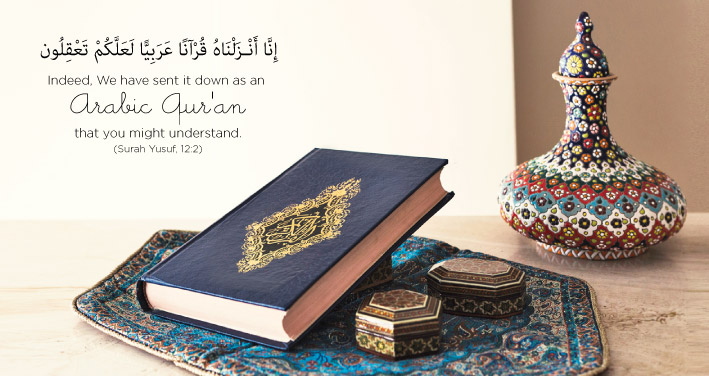
Allah, The All Wise, chose Arabic to be the language of the Quran, the last revelation. It was also the language of our Prophet (s) who taught and explained to us the deen of Islam. Therefore, understanding of Arabic language is not only important but obligatory on every Muslim according to Ibn Taymiyyah (in ‘The Necessity of the Straight Path’).
Many Muslims resort to translation of the Quran for understanding it. Although the translations facilitate some basic understanding of the message, it keeps you away from its depth and beauty. It also hinders one from proficient recitation of the Book.
Many parents take pride in their children’s memorization of a part or whole of the Quran. However, these children have no idea what they are reciting. It’s sad that parroting of the Quran is held so highly and understanding of it has been completely abandoned. How can such a child benefit from the Quran? How will he relate or gain guidance from the Quran – the true purpose for which it was being actually sent?
Also, unless one tries to learn and remember the meanings of various Surahs (chapters), adhkaar (remembrances) and du’aas (supplication) said in the daily Salah (prayer) his or her prayer will be mere utterances of unknown foreign words. How can we expect our children to pray five times without having to prompt them (to say the least) when they have no connection with the One they are conversing because the entire conversation is in an unknown language? How will the prayer become meaningful to them let alone sincere?
Parents must acknowledge the obligation that they have with regards to teaching their children the language of Quran. And they should themselves learn it first if they do not already know it. Yes, it is hard but it is doable. With the ease of internet in our times, we truly have no excuse. It is sad to see parents putting all their efforts, times and wealth in teaching their children worldly knowledge but they have no interest in teaching their children the language that will benefit them in both this life and the next.
Dr. Aisha Hamdan mentions in her book ‘Nurturing Eeman in Children’ the effectiveness of exposing young children to foreign languages. She notes that the time span from birth to age five is critical for language acquisition. Therefore, parents should gather all the means available to them and work hard to teach their children Arabic and incorporate Arabic language in their daily lives before they lose these few precious years.
Some practical ways to introduce Arabic to your children from an early age:
- Recite or play the Quran audio with clear, slow, rhythmic and audible sound everyday when your child is around.
- Recite your adhkaar or du’aas loudly and clearly. Let your child hear you when you say the du’aa before starting your meal, after finishing your meal, before leaving the home, before bedtime, etc.
- You may also want to play Islamic Nasheeds which are without music.
- Begin teaching Arabic to your child at an early age, such as the Arabic alphabets, numbers, and colours. There are plenty of free teaching materials for toddlers at Ummi. Check out my flashcards and activity worksheets.
- Hunt for Quranic Arabic language online courses for children.
- Buy books for a systematic study.
